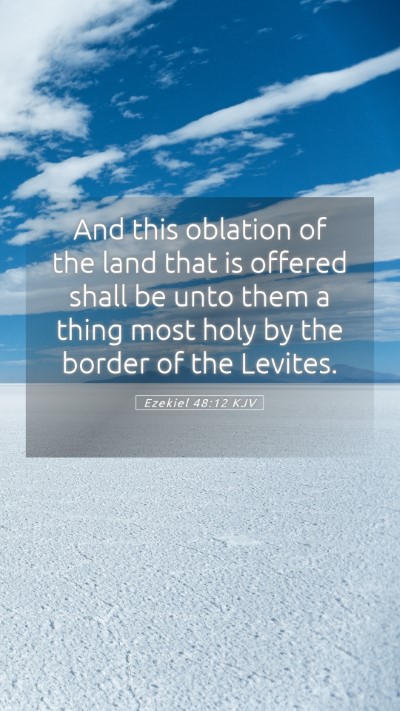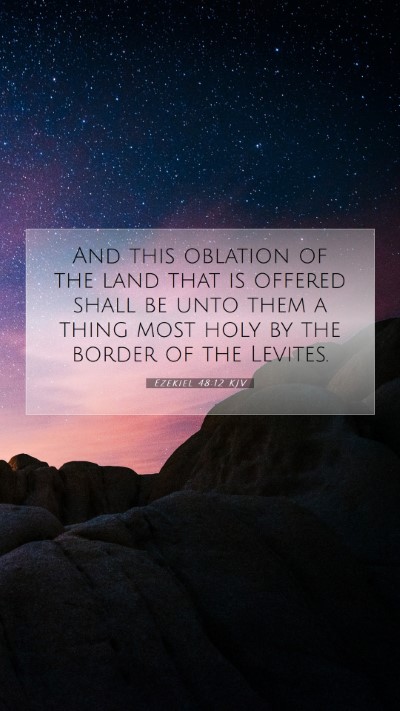Bible Verse Meaning: Ezekiel 48:12
The verse Ezekiel 48:12 states:
"And the portion that you shall set apart for the Lord shall be twenty-five thousand cubits in length, and ten thousand in breadth." (Ezekiel 48:12, ESV)
This verse is part of a prophetic and visionary description provided by Ezekiel regarding the distribution of land among the tribes of Israel after their return from exile. It highlights the Lord's portion, emphasizing the importance of setting apart a land for God's service within the promised land.
Overview of the Verse
- Divine Allocation: The directive given to Ezekiel regarding the land allocated to the Lord underscores the significance of maintaining holiness and setting apart a portion for divine worship.
- Dimensions: The exact measurements (twenty-five thousand cubits by ten thousand cubits) denote an intentional and structured plan for the sacred space, indicating orderliness in God's design.
- Prophetic Context: It occurs within the wider context of Ezekiel's vision of restoration and the re-establishment of the temple in Jerusalem, symbolizing the return of God's presence among His people.
Bible Verse Interpretations
Commentators like Matthew Henry point out that this allocation represents God’s rightful claim to a portion of the land, reflecting a principle of stewardship and dedication to spiritual pursuits.
Albert Barnes suggests that the description provides not only a vision of geography but conveys theological significance regarding the importance of sacrificial devotion to God, in the midst of secular concerns.
Adam Clarke emphasizes the faithfulness with which the returned exiles should honor God's part, understanding that God’s sovereignty necessitates recognition through dedicated space for worship and sacrifice.
Theological Insights
- Holiness of the Land: The land designated as belonging to God signifies that all of creation is ultimately under His sovereignty.
- Role of the Temple: The allocation alludes to the central role of the temple as the place of Divine worship, indicating that engaging with God should always be a priority for His people.
- Community Responsibility: The community's reverence for God's portion showcases their commitment to uphold His standards, subsequently fostering a culture of respect and obedience to God’s Law.
Application of the Verse
From a practical standpoint, believers today can derive significant lessons from Ezekiel 48:12:
- Prioritize God's Presence: Just as the Israelites were instructed to set apart land for the Lord, modern believers should prioritize their relationship with God amid daily distractions.
- Stewardship and Sacrifice: Understanding that our resources can be allocated to God’s kingdom work reminds us of the importance of being stewards of what we have.
- Sacred Space: Creating a dedicated environment for worship in our lives, whether through daily devotionals or structured prayers, mimics this biblical principle of setting apart for the Lord.
Cross References
- Numbers 15:2: God commands Israel to bring offerings, aligning with the established pattern of setting apart resources for His purposes.
- Deuteronomy 12:6: This directs the Israelites to bring their offerings to the place where God chooses to make His name dwell, signifying the significance of worship in designated locations.
- Malachi 3:10: The call to bring the whole tithe into the storehouse parallels the theme of dedicating a portion of what we have for the Lord’s work.
Further Study and Reflection
For those participating in bible study groups or engaging in online bible study activities, consider diving deeper into the principles of biblical stewardship and the theological implications of interpreting this verse in conjunction with the historical context surrounding Israel's exile and return.
Utilizing bible study tools such as commentaries and concordances can enhance understanding and promote fruitful discussions surrounding themes of sacrifice, worship, and community dedication reflected in Ezekiel 48:12.
Understanding the significance of God's portion in our lives can lead to a transformative experience, prompting an evaluation of how we contribute to our faith communities and uphold our personal commitments to holiness amidst societal distractions.


